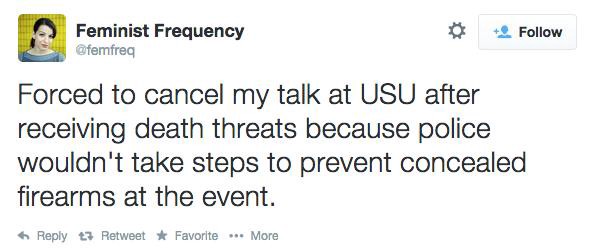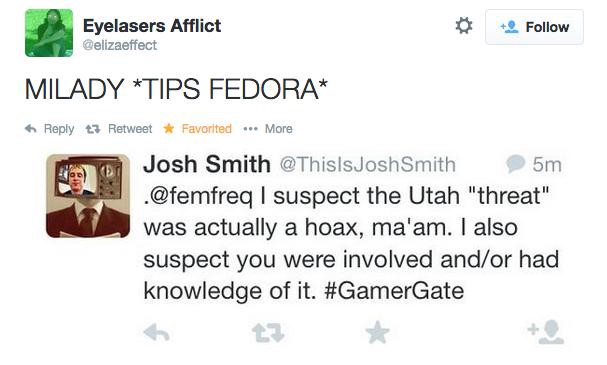Gamergate in Posterity

The hideous mass lash-out known as #Gamergate is snowballing into an unlikely but genuine historical moment. This rings true:
What we have in Gamergate is a glimpse of how these skirmishes will unfold in the future — all the rhetorical weaponry and siegecraft of an internet comment section brought to bear on our culture, not just at the fringes but at the center. What we’re seeing now is a rehearsal, where the mechanisms of a toxic and inhumane politics are being tested and improved. Tomorrow’s Lee Atwater will work through sock puppets on IRC. Tomorrow’s Sister Souljah will get shouted down with rape threats. Tomorrow’s Tipper Gore will make an inexplicably popular YouTube video. Tomorrow’s Willie Horton ad will be an image macro, tomorrow’s Borking a doxing, tomorrow’s Moral Majority a loose coalition of DoSers and robo-petitioners and scat-GIF trolls — all of them working feverishly in service of the old idea that nothing should ever really change.
The ideology that leads a young fan of Call of Duty to tweet threats of violence at women who dare make or write about video games is old and broad and thoroughly rotten. His venues, however, are new: They lower the bar for participation, bringing words that would have been shared in private out into the open, on the internet, turning cruel jokes shared between gamers on the couch into real and terrifying threats posed in public.
The urgent consequence is that this private speech projected into public is harassment. But a future consequence, the closest thing to a silver lining that #Gamergate has, is that at least some of this speech is permanent. The worst harassers and instigators are mostly anonymous, but their legions of supporters and fans and enablers are not.

The older you are, the more likely it is that you’ve said or believed some truly loathsome things in your life; that you’ve been, for lack of a better term, on the wrong side of history. But when you were, you were probably among your cohort — it is in all of your best interest to bury those words, exchanged over beers or in class or over email, forever. This is cowardice and conspiracy. This is also very easy. Ask the old people in your life.
These young men feel like they’re among their cohort, too, but their actions are both material and recorded. They’re not just enabling the status quo with private speech and public silence — their anger and error is being recorded for posterity. I mean maybe all this text gets swept away as the internet remakes itself again and again, taking all the “feminists are ruining my life” and “but it’s actually about ethics in games journalism!” comments with it. But maybe it doesn’t! Maybe this post on gaming forum NeoGAF (via) will play out in slow motion over many years, for thousands of people, as they look back on their own words frozen in amber:
It actually took far, far longer than I’m comfortable with for this to sink into my thick skull. When you finally detach yourself from GG, and move away from the constant reinforcement the group provides that “no, we’re doing the right thing! These are the bad guys, remember how bad they made you feel? We’re doing the RIGHT THING!” you look and see holy shit.
Maybe there will be some small measure of accountability in the far future, not just for public figures and writers and activists, but for all the people who could not or would not see their “trolling” for what it really was. Maybe, when their kids ask them what they were like when they were young, they will have no choice but to say: I was a piece of shit. I was part of a movement. I marched, in my sad way, against progress. Don’t take my word for it. You can Google it!
